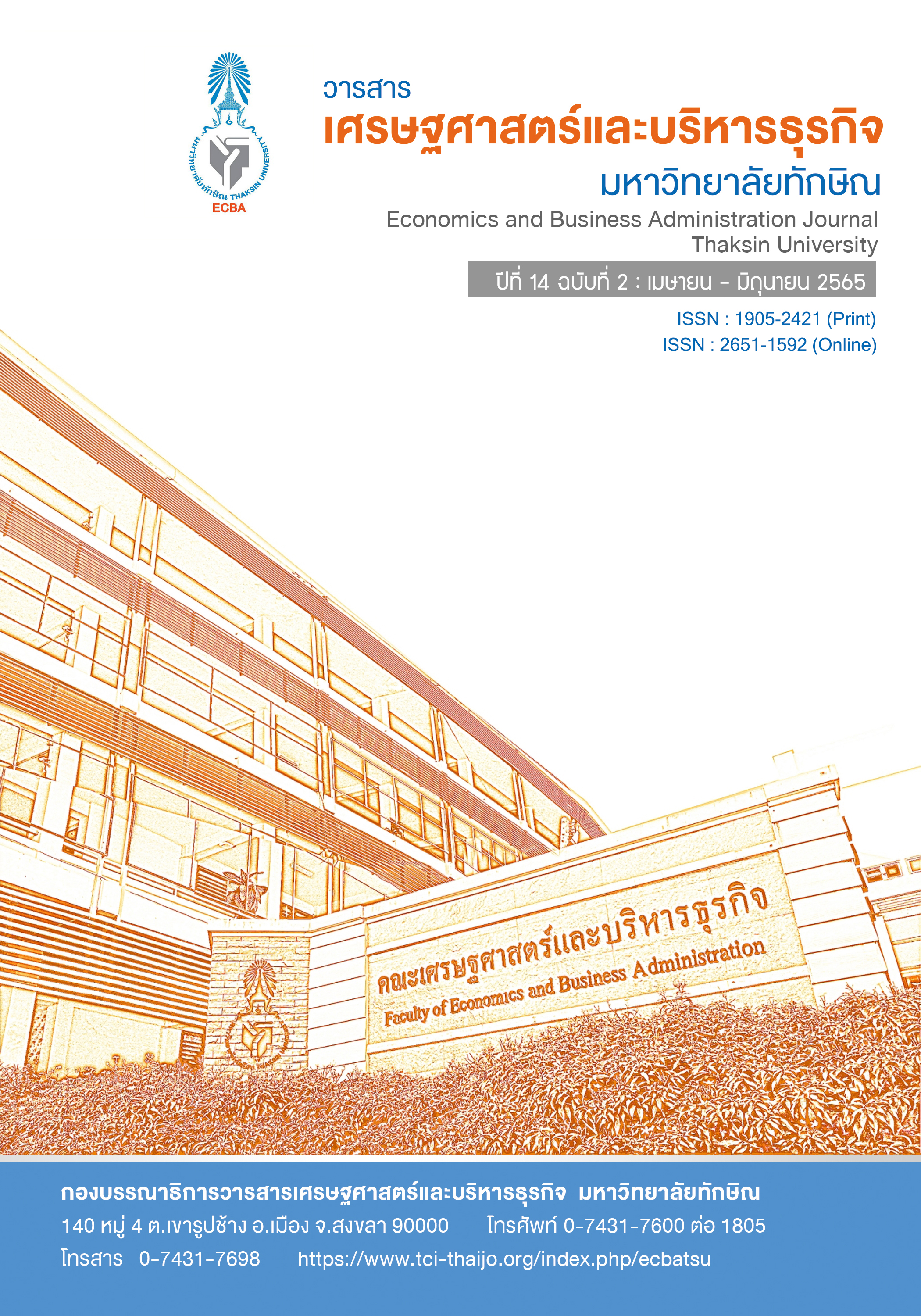Factors Affecting Vegetarian Intention of Consumers in Hat Yai District, Songkhla Province
Keywords:
Intention, Vegetarian Festival, Health ConsciousnessAbstract
Objective of this research is to study the factors influence on vegetarianism during the vegetarian festival of consumers in Hat Yai District, Songkhla Province. By studying 4 factors as follows: 1. Attitude towards vegetarianism behavior. 2.The reference groups 3.Perceived ability to control behavior and 4.Health consciousness. The sample groups were 400 consumers located in Hat Yai District, Songkhla Province by using a Simple random sampling. The research instruments were questionnaires. The statistics used for data analysis consisted of frequency, percentage, mean and standard deviation. And multiple regression analysis was used to test the hypothesis. The research results were found that The sample group were Chinese-Thai. In which vegetarian festivals usually eat only some meals and prefer to buy vegetarian food. The results of hypothesis testing showed that factors of attitudes towards vegetarianism and the perceived ability to control behavior had a positive influence on vegetarian intentions during the festival of vegetarianism of the consumers in Hat Yai District were statistically significant at 0.05. And health consciousness had a negative influence on vegetarian intention during the festival of consumers in Hat Yai district was statistically significant at 0.05.
References
Ajzen, I. (1985). From intentions to actions: a theory of planned behavior. In Action control: from cognition to behavior. Berlin: Spinger-Verlag.
Allwellhealthcare. (2020). Elderly vegetarian food: How to eat without getting fat, get both merit and health Retrieved from https://allwellhealthcare.com/vegetarian-food-for-elderly/.
Becker, M. H., Maiman, L. A., Kirscht, J. P., Haefner, D. P., & Drachman, R. H. (1977). The Health belief Model and prediction of dietary compliance: A field experiment. Journal of Health and Social Behavior, 18(4), 348–366.
Chinfuk, N., LalitSasivimon, W., Nontikarn J., Nilsawat P. D., & WittayaPhanpracha, C. (2017). The Evaluation of Participant’s Satisfaction towards Hatyai Vegetarian Festival in 2017. The 9th Hatyai National and International Conference, 1552-1556.
Felsenstein, D. (2003). Local Festivals and Tourism Promotion: The Role of Public Assistance and Visitor Expenditure. Journal of Travel Research, 41(4), 385–392.
Fishbein, M., & Ajzen, I. (1975). Belief, Attitude, Intention and Behavior:An Introduction to theory and research. Addison-Wesley Publishing Company:lnc.
Hong, H. (2011). An Extension of The Extended Parallel Process Model (Eppm) In Television Health News: The Influence of Health Consciousness on Individual Message Processing and Acceptance. Journal of Health Communication, 26(4), 343-353.
Jaichuen, P. (2018). Factors affecting customer purchase decisions for herbal dietary supplement in the Bangkok Metropolitan area. Thesis of Thammasat University.
Jayanti, K. R., & Burns, C. A. (1998). The antecedents of preventive health care behavior: An empirical study. Journal of the Academy Marketing Science, 26(1), 6-15.
Kasikon Research Center. (2019). The new generation cares ... vegetarian, this year's vegetarian festival expects to spend 4,760 million. Retrieved from https://www.kasikornresearch.com/th/analysis/k-social-media/Pages/FB-J-27-09-19.aspx.
Kraft, F. B., & Goodell, P. W. (1993). Identifying the health-conscious consumer. Journal of Marketing Health Services, 13(3), 18-25.
Ling-Yu, M. W., & Shang-Hui, L. (2013). A Study On The Relationship Amidst Health Consciousness, Ecological Affect, And Purchase Intention Of Green Production. International Journal of Organizational Innovation, 5(4), 124-137.
Mai, R., & Hoffmann, S. (2012). Taste lovers versus nutrition fact seekers: How health consciousness and self-efficacy determine the way consumers choose food products. Journal of Consumer Behavior, 11(4), 316-328.
Phetvaroon, K. (2016). A Model of Phuket Vegetarian Image. Journal of Silpakorn University, 36(3), 115-132.
Prachachat. (2020). Vegetarian vegetarian in 2020 not furiously spread 46,967 million, lowest in 13 years. Retrieved from https://www.prachachat.net/economy/news-534050.
Ranong Cultural Office. (2019). Vegetarian Festival. Retrieved from https://www.mculture.go.th/ranong/ewt_news.php?nid=574&filename=index.
Royne, M. B., Fox, A. K., Deitz, G. D., & Gibson, T. (2014). The effects of health consciousness and familiarity with DTCA on perceptions of dietary supplements. Journal of Consumer Affairs, 48(3), 515-534.
Taweewattana, T., & Kanthawongs, P. (2015). Factor Positively Influencing Healthy Food’s Purchase Intention of Consumers in Bangkok. The 55th Kasetsart University Academic Conference, 400-407.
Downloads
Published
How to Cite
Issue
Section
License
Copyright (c) 2022 Economics and Business Administration Journal Thaksin University

This work is licensed under a Creative Commons Attribution-NonCommercial-NoDerivatives 4.0 International License.




